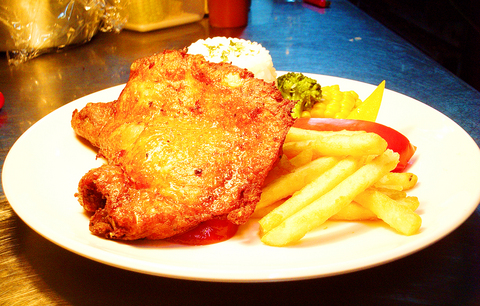Belly Wash (貝利瓦許)
Address: 15, Ln 86, Xinsheng S Rd Sec 3, Taipei (台北市新生南路三段86巷15號)

PHOTO: COURTESY OF BELLY WASH
Telephone: (02) 2362-2468
Open: Daily from 11:30am to 2am, may close later on Friday and Saturday nights
Average meal: NT$120 to NT$230
Details: Chinese and English menu; credit cards not accepted
Several days each week, Simmer Liu (劉桐榮) rises before dawn, grabs his surfboard and heads to the beach. Around noon he packs up and heads back to Taipei, where he runs Belly Wash, a narrow little place that feels like your old neighborhood local despite its flashy decor and hip, office-crowd clientele. Liu — who is only 28 years old but estimates he's held a dozen jobs, ranging from construction worker to bell boy — has pulled off the rare trifecta of designing and managing a hangout that works as a bar, restaurant and cafe equally well and at all hours. And there's a Nintendo Wii that customers can play on a big-screen plasma TV.
Belly Wash is easy to find because several surfboards stand outside. (Liu buys and sells used boards.) Immediately in front is a smallish orange-lit bar with a DJ booth and space-age white barstools. Above this hang martini, champagne and specialized glasses for several varieties of German beer. The setup looks too cool to just casually stroll in; however, it's incredibly easy to strike up conversations both with customers and staff. Here, one drink on a Monday night can easily turn into four or five.
Walking inside from the bar, the design and mood flow naturally into a middle area where the color scheme shifts to comfortable shades of red and grey. Alternating plastic and felt wall tiles give the space a loungy feel and sound-proof the walls. (Liu grew up in the area and is well aware of the noise complaints nearby restaurants and bars have been getting from neighbors.) There are tables with blue felt chairs, and low couches set around coffee tables. In the back, a brick wall and flat screen television evoke the feeling of a living room. One regular, Chen Tz-chian (陳姿蒨), likes to hang out here because it's "quiet" and the light comfortably dim. There's a smoking room in the back, and customers can light up in the rest of place after 8:30pm.
The menu offers an extensive list of Western and Chinese meals and snacks. Liu recommends the "belly-style chicken leg steak" (貝利特調風味雞腿, NT$190), a generous side of dark meat with french fries, rice and vegetables. Each week one such meal is offered for NT$80 or NT$90. Recommended cocktails are the Long Beach and rose (vodka) martini. And there are German beers: especially recommended is the Licher hefeweizen, a good warm-weather wheat beer with a light fruity nose that's not overly yeasty. Also sold are Bitburger pilsner and Bibop, a low alcohol beer-cola.
Liu said he will experiment next month with a NT$500 for men and NT$250 for women all-you-can-drink setup on weekends.

One of the most important gripes that Taiwanese have about the Democratic Progressive Party (DPP) is that it has failed to deliver concretely on higher wages, housing prices and other bread-and-butter issues. The parallel complaint is that the DPP cares only about glamor issues, such as removing markers of Chinese Nationalist Party (KMT) colonialism by renaming them, or what the KMT codes as “de-Sinification.” Once again, as a critical election looms, the DPP is presenting evidence for that charge. The KMT was quick to jump on the recent proposal of the Ministry of the Interior (MOI) to rename roads that symbolize

On the evening of June 1, Control Yuan Secretary-General Lee Chun-yi (李俊俋) apologized and resigned in disgrace. His crime was instructing his driver to use a Control Yuan vehicle to transport his dog to a pet grooming salon. The Control Yuan is the government branch that investigates, audits and impeaches government officials for, among other things, misuse of government funds, so his misuse of a government vehicle was highly inappropriate. If this story were told to anyone living in the golden era of swaggering gangsters, flashy nouveau riche businessmen, and corrupt “black gold” politics of the 1980s and 1990s, they would have laughed.

It was just before 6am on a sunny November morning and I could hardly contain my excitement as I arrived at the wharf where I would catch the boat to one of Penghu’s most difficult-to-access islands, a trip that had been on my list for nearly a decade. Little did I know, my dream would soon be crushed. Unsure about which boat was heading to Huayu (花嶼), I found someone who appeared to be a local and asked if this was the right place to wait. “Oh, the boat to Huayu’s been canceled today,” she told me. I couldn’t believe my ears. Surely,

When Lisa, 20, laces into her ultra-high heels for her shift at a strip club in Ukraine’s Kharkiv, she knows that aside from dancing, she will have to comfort traumatized soldiers. Since Russia’s 2022 invasion, exhausted troops are the main clientele of the Flash Dancers club in the center of the northeastern city, just 20 kilometers from Russian forces. For some customers, it provides an “escape” from the war, said Valerya Zavatska — a 25-year-old law graduate who runs the club with her mother, an ex-dancer. But many are not there just for the show. They “want to talk about what hurts,” she